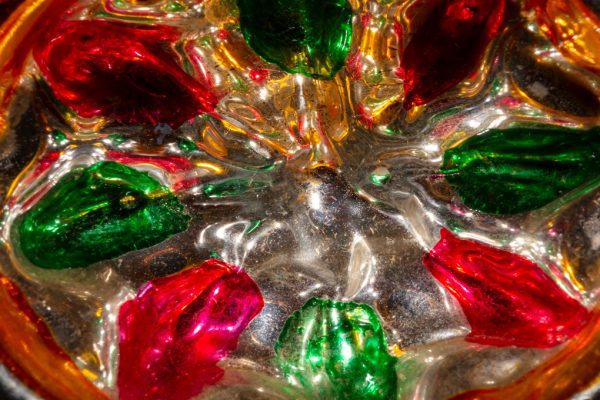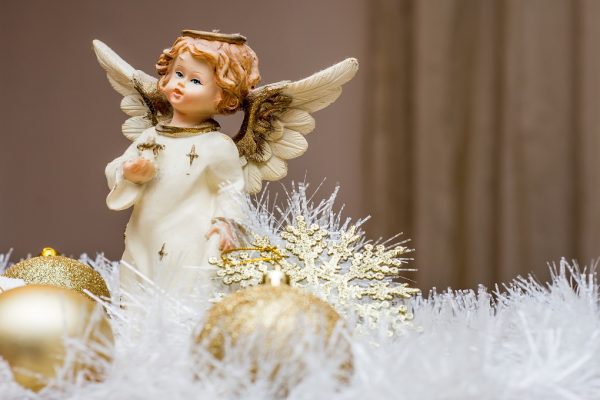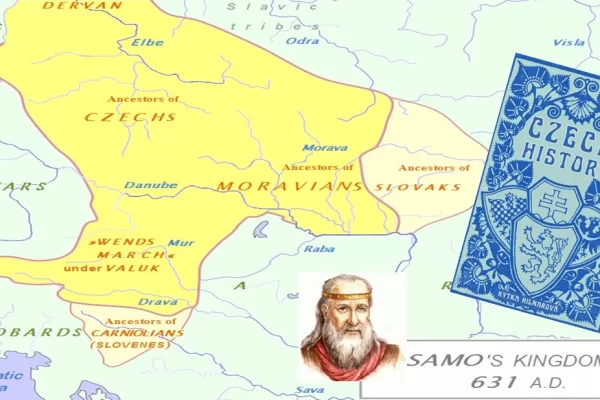While reading, please remember that this post was written and published on September 20, 2018 and I have not been on Facebook for over a year and thus cannot access the group. (Added August 20, 2022) Most of the content is still relevant today.
Today’s post is an experiment. I had some ranting posts at the “Everything Czech” Facebook group and I commented about what I believed people looked at, read, and so forth in terms of group posts and articles here. Because I am curious – today’s post will not be graphically heavy with many illustrations or photographs. Instead, it is filled with words – words that may or may not matter to you. Words that discuss the Bohemian identity of a hundred years ago. Czechs at Ellis Island. Lost newspapers and Czech communities of today and a new breed of Czech (and human) in today’s world. But first things first…
The Home Mission Monthly was a periodical published by the Woman’s Board of Home Missions of the Presbyterian Church. These two articles that discuss Bohemian immigrants appeared in the March 1917 issue. In the first article below, we meet a group of people from the Jan Hus Bohemian Presbyterian Church of New York City and learn of the efforts of the Rev. Vincent Pisek. Reading it, we can imagine life in and around the neighborhood around East Seventy-fourth Street, New York City. In the second article, we spend a day at Ellis Island and can imagine what it must have been like to arrive with all the others from all around the world.
Between 1900 to 1914 – the peak years of Ellis Island’s operation – some 5,000 to 10,000 people passed through the immigration station every day. Approximately 80 percent successfully passed through in a matter of hours, but others could be detained for days or weeks. When World War I began in 1914, Ellis Island experienced a sharp decline in receiving immigrants. But many Bohemians came before that. The first major immigration wave occurred in 1848 when the Czech “Forty-Eighters” fled to the United States to escape political persecution by the Habsburgs. By 1900 there were 199,939 American-born Czechs as opposed to 156,640 Czechs who had been born in Europe.
Yes, you read that correctly. It means that means that more Czechs were born in America than in the Czech lands!
But back to Bohemian identity and Ellis Island statistics – From 178,416 in 1915, the total amount of immigrants entering the United States dropped to 28,867 in 1918. Anti-immigrant sentiment increased after the U.S. entered the war in 1917 and approximately 1,800 German citizens were seized on ships in East Coast ports and interned at Ellis Island before being deported. Also starting in 1917, Ellis Island began to operate as a hospital for the U.S. Army, a way station for Navy personnel and a detention center for enemy aliens. By 1918, the Army took over most of Ellis Island and created a makeshift way station to treat sick and wounded American servicemen.
At the time of the writing of these two articles, March of 1917, Woodrow Wilson had just been sworn in for a second term as President of the United States. And believe it or not, Republican Jeannette Rankin of Montana became the first woman member of the United States House of Representatives.(Yes, over one hundred years ago and three years before the 19th Amendment guaranteed women the right to vote!)
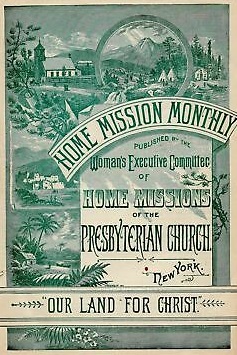
Now keep in mind as you read these two articles, that they were written over one hundred years ago and that they were published by a Presbyterian organization. There is a heavy religious slant to them which may be offensive to some.
Please, just read and enjoy them for the opportunity to time travel and take time to ponder the Bohemian identity and the Czechs of the past and how different they are from the Czechs of today. Many of us can refer to these Bohemians as our great and great-great grandparents. In the EverythingCzech group on Facebook, I recently posted photographs of the Jon Hus church in New York as well as some Chicago Czech neighborhood information from around the same time. If you have anything to contribute, please do so in the comments section below so that it advances all our knowledge together as a Czech community.
Now, on to the articles:
Americanizing the Bohemian and Bohemianizing the American
By Rev. Kenneth D. Miller
Recently, a group of young people from the Jan Hus Bohemian Presbyterian Church of New York City was invited to give a recital of Bohemian folk-songs at the home of one of New York’s society leaders. The singers appeared in the picturesque native costume of the Czechs, and sang a number of the melodious appealing songs of their homeland.
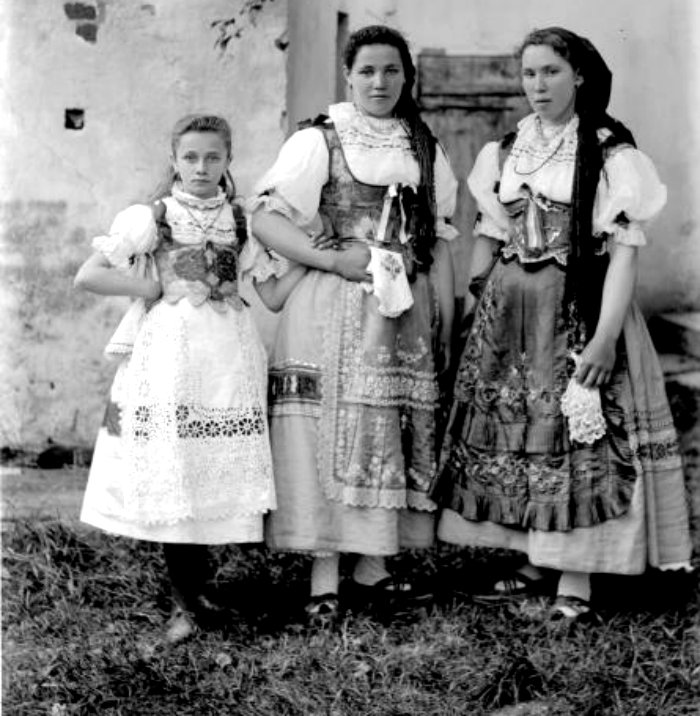
Of course, all the songs were in the Bohemian language. After the recital, the guests mingled with the singers and engaged in conversation with them. It was very interesting to hear the comments made by those young people afterward. “What do you think one of those ladies asked me ?” one exclaimed, quite indignantly. “She asked me if I spoke English! She must have taken us for a lot of immigrants!”
Of course, it was a perfectly natural question for the woman to ask. But the reaction of these young people to that question was equally natural, and most revealing. Those young people were born in this country, reared in our New York public schools, and are now taking their part in our American life.
The fact that they were born of Bohemian parents, and that they have learned the language and the songs of their parents, does not, to their minds at least, make them any the less Americans.
We who call ourselves “pure Americans” have manufactured “hyphenated Americans” out of people who have fully as much right to consider themselves pure Americans” as we; And their resentment at being considered “foreigners” is completely justified. The danger with these “native born of foreign parentage” is not that they shall not become Americanized, but that they shall become Americanized too quickly and too superficially.
To illustrate: Not long ago two Bohemian youths contracted the cocaine habit. They were caught, and sentenced to several months’ imprisonment. Upon their release their first act was to seek out the man who had informed against them, and shoot him. They are now serving a life sentence in Sing Sing. Those boys did not form the cocaine habit because they were Bohemians, or because they were foreigners, but because they were subjected to the temptations of our East Side tenement district. Their downfall was due to the influence of America.
We made Americans out of them, but criminal Americans. Notice, too, how hard the second generation boy goes in for “craps,” and how quickly the second generation girl adopts the extremest style of dress. That is what “being an American” means to them.
Many of these young people lose here in America the language, the traditions, the customs, the ideals that had meant so much to their fathers and forefathers. Some are ashamed of their heritage. One girl whom I know always says she is of German descent because she is ashamed of being a Bohemian.
What?! Ashamed of the land that gave to the world Jan Hus and Comenius and has so much to give today? I am thankful that there are not many such.
No, it is the good Bohemian patriot that makes the good American patriot. That man or woman, boy or girl, who is ashamed of the Bohemian language, who forgets the customs, music,” arts and religious ideals of his forefathers, will never become a good American citizen. The Bohemians have much to give to America, and they fail to do their duty to themselves and to the land of their adoption if they withhold these gifts.
It is with such a faith as this that the Jan Hus Church and Neighborhood House has deliberately set out to Bohemianize the American-born Bohemian by bringing out and preserving the music, arts and historic religious ideals of the Bohemian people, to whom they minister for the betterment of the people themselves and the enrichment of this land of ours which they so dearly love.
The opportunity for this church to do this is the greater because the neighborhood in which it is situated is almost entirely Bohemian. About 30,000 people of this nationality live in the blocks immediately adjacent to the church on East Seventy-fourth Street, New York City.
To lend a Slavonic atmosphere to the church and parish house, a number of rooms have been fitted out in true Slavonic style, with real peasant furniture and mural decorations. The peasant arts are represented by remarkable exhibitions of Slavonic embroideries and hand-painted china. These collections have been made through the efforts of the Rev. Vincent Pisek, D. D., pastor of the church for the past thirty years, and produce the effect of a bit of Bohemia.
It is truly a unique and fascinating exhibition, and the Americans who have seen it have gone away with a new appreciation of the people who could do such truly artistic work. But best of all, these Slavonic arts are being cultivated among the people themselves. Classes in Slavonic embroidery and in china painting, and a splendid chorus of seventy voices which makes a specialty of Bohemian folk-songs and dances, are accomplishing much in the way of keeping the Bohemian spirit alive in the hearts of the young people born here.
All of the work carried on—and the large plant is a veritable beehive all day and all evening, seven days in the week—centers around the church and the Sunday school. If, on coming here to America, the Bohemians and their children lose the arts and talents which make life in their homeland so colorful and attractive, the loss is a sad one indeed. But if, on coming here, they lose the religious faith that made the name of Bohemia sound around the world at the time of Jan Hus, that is a greater and a sadder loss.
The Bohemians in America, more than any other nationality, have given themselves over to atheism, and their children are growing up to be American citizens who know not God. Against this current of unbelief the Jan Hus Church is setting itself. The Sunday school has nine hundred and fifty scholars, the church three hundred and fifty active members. Through the church and Neighborhood House, over seven hundred Bohemian families are reached, and in each a seed of the true religion of Christ is being planted. In this light the problem is not so much one of Bohemianizing the American, or Americanizing the Bohemian, but rather that of Christianizing people who need God.
The Americanization of the Bohemian does not necessarily mean taking all the Bohemian out of him. On the contrary, we must preserve in him the very best that his heredity gives, and then bring to bear upon him the very best that is in our American life.
We “pure Americans” are Americans by the accident of birth. These people are Americans by choice. Of all the countries in the world, they chose to cast in their lot with us. The question of the hyphen does not arise in their minds. They are interested in the welfare of their homeland.
Having tasted of the freedom of America, they desire that same freedom for Bohemia, and are willing to work and to give to secure her independence. But for America they will give their all— for this is the land where they found freedom already established, and where they have found liberty for themselves and their children.
They have found freedom for themselves here in America; it is for us to help them to find here —God. It is not easy to find God in the East Side streets and tenement houses. The devil is much more accessible. But of one thing we can be sure —if we can bring more of the divine into our city life, where these people can see it and come in contact with it our problem will be solved. Christianize our cities, and the problem of Americanization will take care of itself.
Surely Christ would not have us think of the Bohemian- American with the hyphen dividing the two; but rather of the Bohemian+ American for the cross alone will unite the two into one nation under God.
The Present Immigration
By Teresa Fransee, Presbyterian Missionary at Ellis Island. (Miss Fransee is a Bohemian and also speaks the Slovak, Polish, Ruthenian, Russian, Croatian, Serbian, Slovenian and Bulgarian languages. March 1917.)
During the past year, Italians and natives of the Balkans came to the United States by hundreds, some times thousands, every week. Especially was this true just before the new year, because there were rumors in their countries that the government was about to forbid all immigration.
The rooms at Ellis Island were full of these people; from every ship there were hundreds detained for special inquiry. There were also deportations to those countries. Scandinavian ships brought during the year hardly less people than before the war. During the last two months of 1916, they brought many Russian and Polish girls who had been employed on farms in Denmark and Norway. These girls left their countries before the war, and would now have returned had that not been impossible.
There are practically no homes left in Galicia and the part of Russia from which they came; therefore, they have emigrated to the United States. All are strong, healthy women; some little over sixteen years of age. Some Russian liners also have arrived at long intervals. The last of these ships struck a mine near the Scotch coast, and the poor immigrants, women and children, came to Ellis Island without baggage and most of them very poorly clad, because they had had to leave everything when hastily transferred to the life-boats. They were brought in on the Red Star liner Lapland, and their baggage, which was picked up from the much damaged Kursk, was brought in by an American Line ship. Among these people were some of the sweetest of children. While at Ellis Island, their wants were supplied by the missionaries, and they also received Christmas toys.
Immigrants from Austria, Germany and Russia, most of them Jews, have been brought in chiefly by the Holland-American Line, though often people of these nations arrive on French, English, Scandinavian or Italian ships. These latter immigrants are usually those who have received their tickets from relatives in the United States.
When ships land, I meet the people of nationalities with which I work. As they enter the room where they change their money and exchange orders for tickets or purchase tickets, I speak to the women and children, sometimes remaining with a group, telling them what papers and checks to have ready before they are needed, accompanying them to the telegraph desk and to the railroad waiting room. Others having no one with them have to stop and hunt for the desired papers in pockets, satchels and other hiding places. I remain with them until their baggage is insured if they have any, and until they have visited the lunch counter and settled down to wait to be taken to the train. Several times I repeat this program with different women.
When those arriving are not of nationalities belonging to my care, I go instead to the detention room. There I become acquainted, learn the cause of detention, and take the first opportunity to give comfort. I learn that a detained woman has borrowed five dollars from some other woman not in that room. She would like to return the money, having found it will not help, since she must wait for money from her husband in any case.
A girl had been carrying a satchel for a woman who has a large family of children, having thought they would be going all the way together. They have been separated, however, and she would like to return the satchel to its owner.
Another woman loaned money to a new friend on the steamer whose name she does not know. She has even forgotten her destination. Pieces of personal property have been forgotten by others. How thankful I am that I can help to straighten out these difficulties. They are but trifles, but my assistance gives comfort to the strangers in our land.
A little later, the railroad work being done, only the detained are to be cared for. There are little children dressed in their best to arrive. The color of their little dresses will soon be changed, for they will be sadly soiled as they wait in the detention room. As far as my supply goes, they receive aprons. One has lost a hat, another looks cold. A little girl who wears as a wrap only a small shawl gets a coat— if there is one to give away.
Fathers who left their families in the old country when they came to America usually send money to help them, but soon after the war began the sending of money became more difficult. People judged that when letters were months in reaching their destination and some never arrived, it would be the same with money, and therefore felt it unsafe to send it. Consequently, families were often in great need.
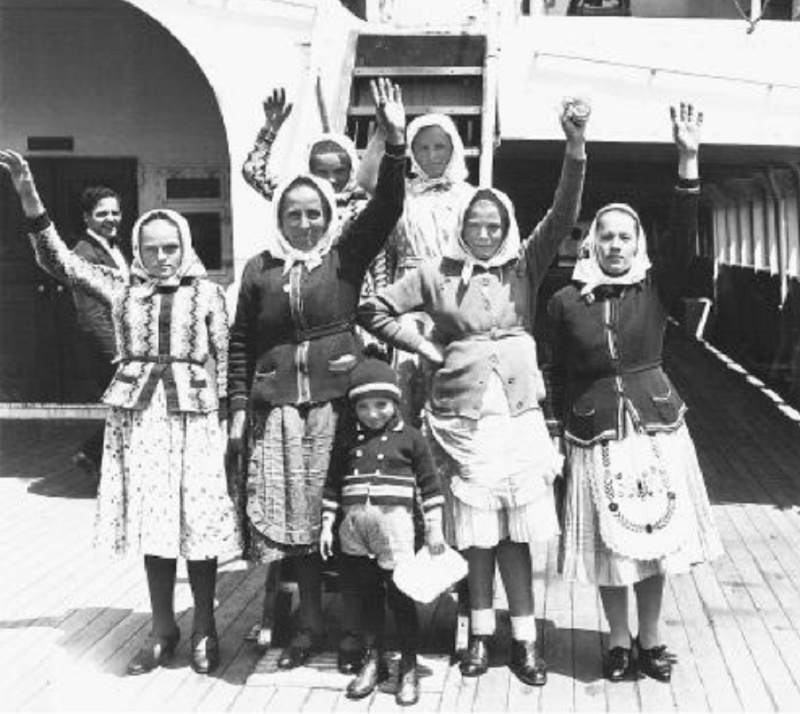
One very fine Bohemian family received no money from the father in a long time. Finally he sent tickets for them to come to America, but they had to wait a year for their passport. Not only fathers but brothers and other relatives are sending tickets rather than money to Europe. The government of Austria desires to keep its citizens at home, and after the war hopes to get the fathers back also. For that reason Austria hesitates to let the people go. Bohemians are most affected in this way.
We have already received some of the first fruits of the war —widows and orphans. One young widow whose husband died in the war, is now waiting for a bond. With her are her two sisters, one of whom is to be married when they reach their destination. There are many sides to the missionary work at this port of entry. Amid the acts of kindness, we hope the seed of the gospel is sown.
[At a recent meeting of the missionaries at Ellis Island and the Committee on Protestant Work it was decided that appeal be made to those women living in the vicinity of New York who have gardens, that they send flowers to the missionary of their church to be distributed among the immigrants. —Home Mission Monthly Editor.]
Above two articles source: Home Mission Monthly published by the Woman’s Board of Home Missions of the Presbyterian Church, March 1917 issue.
Bohemian Identity
So what is it that makes us Czech? Is it that we occasionally prepare or eat the foods when a local Czech club creates a festival? Is it that we talk about drinking good Czech beer? Is it visiting there regularly? Is it belonging to a group or participating in the Czech schools? Maybe it’s a little or a lot of all of the above. But is that enough?
I recently shared a bit of a rant in our Everything Czech Group where I got frustrated that some people had mentioned no festivals existed in their area. I responded with the following:
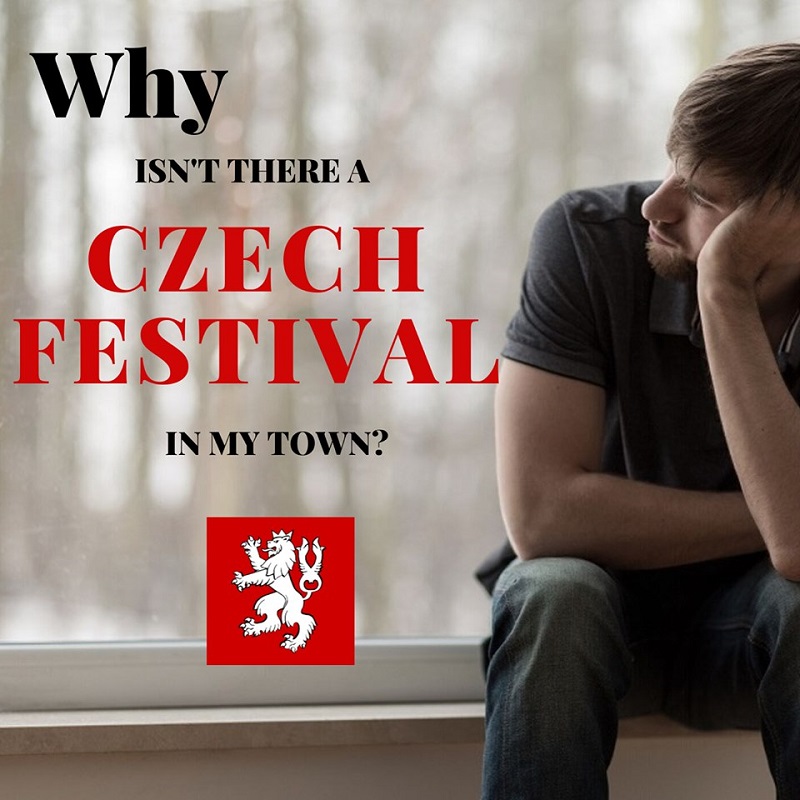
It takes a team of dedicated people to plan an event… Past generations understood the value of coming together to make such things happen. These days, people rarely even come together for company. Those who do plan events have “haters” complain instead of respecting and valuing the incredible amount of work it takes to plan such an event.
In the age of (anti)social media, many people hide behind their devices and spend hours cutting down works that those who are out actually doing things. My suggestion then is to create a group in your community and plan an event. Brainstorm, invite team members who can provide resources: Where will it be held? What is the purpose of the event? Who will provide entertainment or food? The thing is, without non-profit status, such an endeavor rarely even gets off the ground. Everyone just wants a tax break and the people of today end up saying, “My Time is valuable – who will pay me to invest all these hours?” It’s a mindset that is ruining the fabric of community. Who is willing to take it on and make it happen? We used to have planners and leaders where we now have spectators and chronic complainers.
In my personal case, my parents had a motel in Florida. Each year so many Czechs would come and stay – several for free because they had emigrated. (They even assisted some notable and famous Czechs.) My parents fed them, searched for jobs for them, drove them around to get their papers, licenses, find apartments. On the weekends, they opened the motel pool and outside area to all the Czechs in the area who would come for a potluck style meal and an evening of entertainment, for which my mom always made plenty of potato salad, cutlets and chlebicky. Group signing and guitar would play late into the night…
When I was younger and lived in West Hollywood and was nostalgic for Czech things, my parents would reach out to the community and Czechs (even several famous ones) would open their doors to me. Only now do I realize the immense value of those times. Maybe I mention this because there was no “class divide” and being Czech meant you fit in, rich or poor, famous or unknown – the country is so small and Czechs were so happy to see their fellow “people” that connections easily and often happened!
These days, I guess my generation – the children of this awesome group of Czechs – never offer an invitation for coffee or any type of evening. Their doors remain closed unless it brings them a tax-break, personal significance or some recognition, which is tragic and sooooo sad.
Have the Czechs lost their heart?
Have all people disconnected from their fellow humans on this level? Czechs used to be famous for their hospitality. At least when we visit Prague the Czechs are warm and welcoming. If you are a guest in a Czech home, they offer you whatever they have available to eat and drink. If they come visit you they bring flowers and sweets or chlebicky.
To honor my heritage and what my parents and grandparents did, we have always extended a welcome and opened our doors to visiting Czechs. But I really know no more Czechs who gather and the ones I know rarely connect. I’ve looked for help in trying to organize events and have reached out to folks when visiting other places – to share what we know and bring some Czech energy or friendship for Czechs in other places – to no avail.
Heck, I just posted earlier this week we were going to New York for a bit at the end of October and did anyone even respond?
Nope. Thus far, not a one.
My parents’ friends would have gladly hosted us, met us for dinner or drinks. But that generation is dying off… and so is their sense of hospitality, Czech pride and just good old-fashioned courtesy. In fact, at the time of my parents, it would have been an honor and a privilege to extend our Bohemian hospitality!
I miss the manners and the mannerisms.
A few days ago, I was sad to read comments about how the Texas and Nebraska festivals “aren’t even Czech” – and I commented that most of those people are descendants of Bohemians and Moravians from several generations back. At least they are trying!!!! And what did their efforts solicit? Insult and complaint. I wanted to say, “What do YOU do for your community?”
Will the Real Czechs Please Stand Up!
Alas, this is a great source of frustration for me and makes me want to completely shut down the website, this group page, Facebook – all of it. Where are the REAL people at? The good people? Sometimes I think half of the profiles here must be fake or bots just to start arguments instead of to inspire intelligent discussions – and to even further separate people from one another.
When reading posts and commenting, please remember that there are actual PEOPLE who put in time and energy, and they deserve support for what they create or share.
The Czechs of older generations valued their heritage enough to throw TIME AND MONEY at it, not to sit by passively or to complain.
They TOOK ACTION and if they could not physically make it happen, they would offer the finances to do so. People gave what they could and the statues and buildings in Chicago, New York and other places show this.
It was the time of the Great Depression – for God’s sake – and people were out of work and starving – yet they still made it a priority and considered it THEIR DUTY to honor and elevate their culture and celebrate their roots – and even if all they had was a few pennies – they put it into the community pot towards something of permanence that would announce that they (the Czechs) were here (in America) and had not forgotten whence they came!
We (the girls and I who started this group and the TresBohemes | EverythingCzech website can barely keep scraping enough money to pay for the maintenance of the site. We have over 100,000 visitors per month but fewer than 1% comments at the site. The Facebook group has grown to over 25,000 members and the most comments come from infographics and photos – usually on food or liquor. Historic, traditional, or cultural posts are often overlooked and probably even less people actually click and read an article with more than 3 paragraphs.
Is anyone even READING the blog posts we post at the site anymore? The comments there have died down to almost non-existence and based on Google analytics which tell me how long people are on each page, most people just scroll the page and look at the photos.
A quick and superficial fix to feel like they’ve connected with their Czech heritage.
Each post at the site has a “support us” button at the bottom and donations are very rare. The site only continues to exist primarily because of a few supporters who carry the whole crowd. I wonder if every visitor gave just a dollar or five, how much more we could grow and offer. But the support is just not there. Someone has told me that as a business venture, it’s failing miserably.
(Update August 20, 2022 – nothing has changed. It’s gotten worse since I cannot post on Facebook. Support is so little each month I have great anxiety that all this work will be lost and the site will be taken down. I feel as though I have too beg every month for support to pay for the expenses of the site. It is humiliating when all I am trying to do is keep the heritage and site alive!)
Not Everything is a Business Venture
We began this as a passion project – passionate about our heritage and wanting to have a place where others could learn about and carry pride in their heritage. But in terms of monetary “value” it’s not worth a red cent which is depressing because that means that our thousands of hours of research, writing and work are not worth a red cent either.
Anyhow… I guess this is the end of my rant, except to say that people then valued human connection and would invest time, money and whatever other resources they could to make connection happen. Today, that connection is all but lost forever. When the beautiful old buildings they (early Czech immigrants) built – with literally pennies scraped together – were constructed and stood proud, they believed they had cemented some of their Czech roots here, but alas, time has shown that the character and the spirit behind it was not to stand as long as the buildings.
It’s tragic. Especially considering remembering how important it was to our ancestors that we remember and remain Czech! The point is, if you want Czech connection – you have to make it happen and/or support the making of it as best as you can – Otherwise nothing happens….
Further Reflections
After taking part in the conversational comments attached to the above post, I feel even more eager to shut this website down and instead focus on books and perhaps a subscription-based newsletter that comes the old-fashioned way – in the mail. Yet isn’t that what killed so many of the old Czech newspapers here in America? It just wasn’t cost effective. In the age of free information – does anyone really even value what writers write anymore?
I feel I am a dying breed. I should just let go already and slip into obscurity.
Many of the community based cultural centers have also faded into obscurity. Entire towns, in fact, seem to vanish under what was once a wonderful dream. Take Masaryktown in Florida, for example. We wrote about it here. What about the once thriving community of Wilson, Kansas? Gone.
Most clubs and centers will say that most of their regular patrons are elderly immigrants. That generation is dying out. They are thrifty and budget conscious and don’t spend a lot of money. Yet buildings have ever rising taxes and rents to pay. Revenue in most became so low in between the 1990s – 2010s that the halls, centers and even restaurants and other businesses closed.
The next generation (their children) just did not care to keep up the fight. They’ve been Americanized for the most part. Many of my parents friends adult kids (my generation) laugh behind my back for “hanging on to old stuff that no one cares about.” (Yes, I really heard that they said this.)
One comment mentioned that tradition and culture are rapidly being replaced by indifference and consumerism, and that in a global-interconnected world, culture and tradition are less and less important to many people. I recently read the following which I shared in my response:
In Consuming Life, Polish sociologist Zygmunt Bauman explains that “a consumerist culture, departing from the previous productivist culture, values transience over the duration, newness and reinvention, and the ability to acquire things immediately. Unlike a society of producers, in which people’s lives were defined by what they made, the production of things took time and effort, and people were more likely to delay satisfaction until some point in the future, a consumerist culture is a ‘nowist’ culture that values immediate or quickly acquired satisfaction.”
This would coincide with shorter attention spans, quick-fixes with just a scanning over photos in a post and quickly moving on to the next thing the internet has for us. The article continued:
“Similarly, our expectation for a community and our experience of it is fragmented, fleeting, and unstable. Within a consumerist culture, we are members of ‘cloakroom communities,’ which ‘one feels one joins simply by being where others are present, or by sporting badges or other tokens of shared intentions, style or taste.’ These are ‘fixed-term’ communities that allow for a momentary experience of community only, facilitated by shared consumer practices and symbols. Thus, a consumerist culture is one marked by ‘weak ties’ rather than strong ones.”
It’s a fascinating article which explains perfectly what I have been feeling lately.
It makes me question, is providing the site here in this format a mistake? I’ve often felt that people do not value it because of the financial aspect – but perhaps wanting to provide free content for those who are nowhere near a Czech community is actually being a part of the problem. For like the Czechs of older times, perhaps we’d move to be closer once again to that what matters most.
Perhaps if everything was not so easy and at the ends of our fingertips, we’d work harder to create our own communities. We’d once again gladly pay for newsletters, newspapers, books and magazines that bring us the information we so hunger for and reward those who create it for us.
Maybe we would be happier making cornhusk dolls, re-learning needlepoint and creating cloths with lovely embroidered motifs of our homeland. We’d gather in kitchens and trade recipes and bake together for wonderful potlucks where we would carry our dishes with pride.
Our goal has always been to keep people linked to their Czech roots – but maybe it’s just not meant to be….
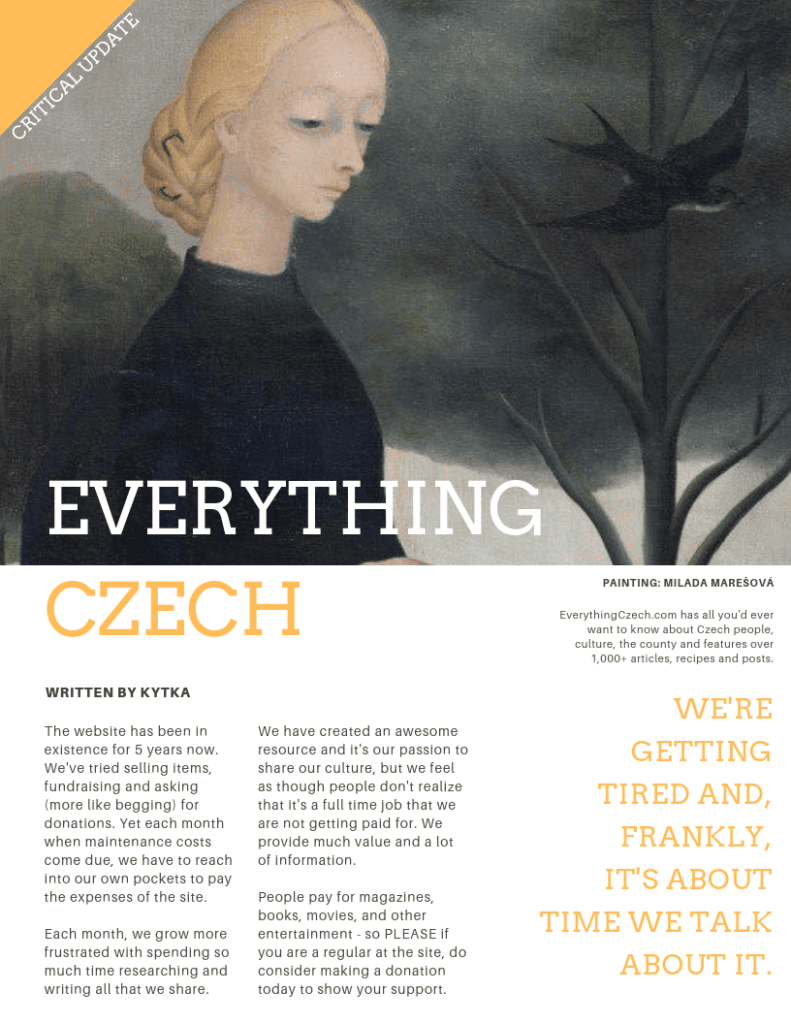
If only…
Further Reading
- Everything Czech Facebook group post where we discussed New York City.
- Everything Czech Facebook group post about the John Hus church in New York City with lots of photographs and current information.
- Everything Czech Facebook group post where we discuss Czech communities today.
- The Definition of Consumerist Culture article I refer to.
- Reality Check – Slum Life In New York City During the Nineteenth Century’s Gilded Age.
- Will the Real Bohemians Please Stand Up.
- Bohemia: Czechs in New York at the Settlement at Long Island.
- Historical Czech Chicagoland – Czechs in Chicago at the turn of the century..
Thank you for your support – We appreciate you more than you know!
We know that you could spend hours, days, weeks and months finding some of this information yourselves – but at this website, we curate the best of what we find for you and place it easily and conveniently into one place. Please take a moment today to recognize our efforts and make a donation towards the operational costs of this site – your support keeps the site alive and keeps us searching for the best of our heritage to bring to you.
Remember, we rely solely on your donations to keep the project going.
Thank you in advance!
If you have not already subscribed to get TresBohemes.com delivered to your inbox, please use the form below now so you never miss another post.




